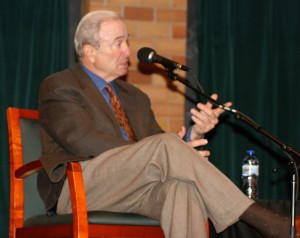Ken Auletta, media writer for The New Yorker and bestselling author, discussed life as a journalist and his most recent bestselling book, “Googled: The End of the World As We Know It,”
Thursday evening in the O’Shaughnessy Educational Center auditorium.

Auletta spoke with Kerri Miller, Minnesota Public Radio host, about the digital revolution and the media divide it has caused. Auletta said media belongs to two worlds: traditional and digital. Although both worlds seek to find their own “brand,” or identity, Auletta said, he hopes that someday they will come together.
“There are two types of people,” he said. “There are the people who lean back, and there are the people who lean forward and say digitalism is an opportunity,” Auletta said.
Freshman Nathaniel Binversie had some opinions of his own.
“I think the digital divide is slow to get going due to the fact that people don’t want to pay for anything and we want to get all our information free,” Binversie said. “Until they find some way to get revenue without asking people to pay for it, because people aren’t going to, I think that [digital media] is not going to be as successful as they want it to be.”
Freshman Emily Hoffmann said because of our need for instant information, quality interviews have been lost within the digital world.
“You’re not investing that time as much,” she said. “It’s more so that quick interview; you put it online and then it’s onto the next thing.”
Auletta said traditional media generally provides more depth to its stories, but the digital world has greatly influenced today’s media.
“I feel like there are so many different avenues for digital media now, and really, if you think of what’s capturing the youth, what’s capturing people in general, it’s the digital age,” Hoffmann said.
Auletta as a journalist
As a journalist, Auletta said, asking about his subjects’ past, gaining their trust and going back for a second interview helped him to further understand their actions and motives.
“The life I live now is a life of asking questions,” he said.
Auletta also emphasized the need to please his readers instead of his subjects.
“That’s where the ruthlessness comes in,” he said.
Auletta, who said he keeps a personal divide between him and his subjects, does not pursue friendships out of his interviews.
“I think journalists have to be tougher than politicians,” Auletta said. “Politicians have loyalties, but journalists do not.”
Rachel Britton can be reached at brit7192@stthomas.edu.
